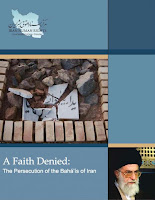
The Iranian government appears to be laying the foundation for a new cycle of persecution against Iranian Baha'is, said a human rights organization specializing on Iran.
The Iran Human Rights Documentation Center (IHRDC) said in a report released last week that recent events in Iran, especially when viewed through the long history of religious persecution against Iranian Baha'is, is cause for alarm.
"Given the Islamic Republic's history of implacable hostility towards the Baha'is, and the [Islamic Republic of Iran] leadership's personal animus towards the faith, the IHRDC is greatly concerned that the Baha'i community in Iran may soon face another cycle of repression and violence," states the report.
The 60 page study, titled "A Faith Denied: The Persecution of the Baha'i of Iran," outlined a number of trends that bode ill for Iranian Baha'is.
These trends include the "return of populist conservative politicians," "growing tensions between the Islamic Republic and the international community over Iran's nuclear program," the blatant collection of intelligence on Baha'is, and increased anti-Baha'i articles in the news media.
Released on 15 January 2007, the report also catalogs the long history of persecution directed against Iranian Baha'is, seeking to show how recent events "are consistent with the decades of implacable hostility displayed by the clerical establishment prior to the Islamic Revolution and identifies many of these same clerics who today hold positions of political power," according to an IHRDR press release.
The report also said that:
-- The Shi'a clerical establishment in Iran has long regarded the Baha'i Faith as a heretical deviation from Islam. The Baha'i community has suffered most severely when the clerical influence in national affairs has been strongest.
-- Earlier campaigns against Baha'is, such as in the 1950s and early 1980s, saw the use of propaganda to cultivate and justify social persecution, creating negative stereotypes. These stereotypes continue to have repercussions today.
-- Despite its wide recognition outside Iran as an independent world religion, the Faith has been effectively criminalized in Iran, through efforts to categorize it as a political threat. This categorization has been reinforced by frequent accusations of espionage or other anti-revolutionary criminal activity.
"Practicing members of the Baha'i faith are subjected in the Islamic Republic of Iran to a level of social exclusion and harassment that shocks the conscience," said Tom Parker, Executive Director of the IHRDC. "Community leaders have been murdered and sites of irreplaceable religious significance destroyed.
"Ordinary Baha'is are refused access to education and employment opportunities and cannot openly worship. They have become third class citizens in the country in which their faith was born. It is difficult to imagine a more clear-cut case of religious persecution," said Mr. Parker.
Established in March 2003 by an international group of human rights advocates, scholars, and lawyers, the IHRDC seeks to "objectively and systematically document human rights violations committed in the Islamic Republic of Iran since the 1979 revolution," according to its website.
The full report can be read there at http://www.iranhrdc.org/





1 comment:
I think one of the ways we can be s painted into a political corner is to emphasize the world-wide character of the Baha'is. Wikipedia has a number of biographies of individual Baha'is - a few are from Canada or Brazil or New Zealand, though many are from America too. Perhaps the alternative language wikipedias could be reviewed for such kind of entries to show more of our international character.
Post a Comment